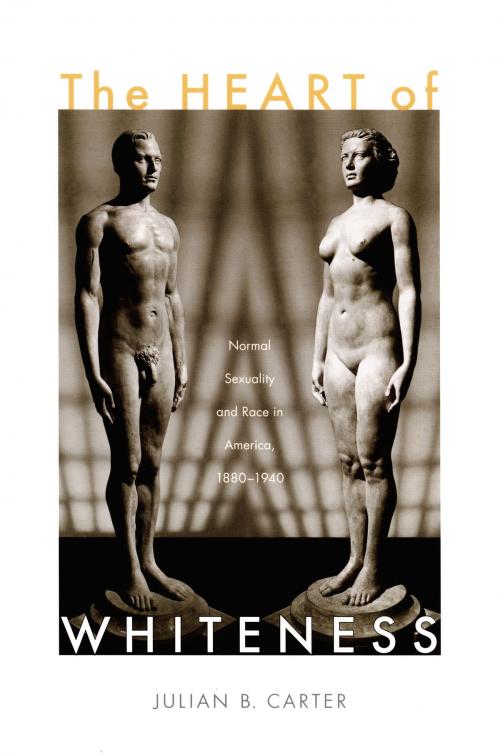The Heart of Whiteness
Normal Sexuality and Race in America, 1880–1940
Nonfiction, Social & Cultural Studies, Social Science, Cultural Studies, Ethnic Studies| Author: | Julian B Carter | ISBN: | 9780822389583 |
| Publisher: | Duke University Press | Publication: | June 8, 2007 |
| Imprint: | Duke University Press Books | Language: | English |
| Author: | Julian B Carter |
| ISBN: | 9780822389583 |
| Publisher: | Duke University Press |
| Publication: | June 8, 2007 |
| Imprint: | Duke University Press Books |
| Language: | English |
In this groundbreaking study, Julian Carter demonstrates that between 1880 and 1940, cultural discourses of whiteness and heterosexuality fused to form a new concept of the “normal” American. Gilded Age elites defined white civilization as the triumphant achievement of exceptional people hewing to a relational ethic of strict self-discipline for the common good. During the early twentieth century, that racial and relational ideal was reconceived in more inclusive terms as “normality,” something toward which everyone should strive. The appearance of inclusiveness helped make “normality” appear consistent with the self-image of a racially diverse republic; nonetheless, “normality” was gauged largely in terms of adherence to erotic and emotional conventions that gained cultural significance through their association with arguments for the legitimacy of white political and social dominance. At the same time, the affectionate, reproductive heterosexuality of “normal” married couples became increasingly central to legitimate membership in the nation.
Carter builds her intricate argument from detailed readings of an array of popular texts, focusing on how sex education for children and marital advice for adults provided significant venues for the dissemination of the new ideal of normality. She concludes that because its overt concerns were love, marriage, and babies, normality discourse facilitated white evasiveness about racial inequality. The ostensible focus of “normality” on matters of sexuality provided a superficially race-neutral conceptual structure that whites could and did use to evade engagement with the unequal relations of power that continue to shape American life today.
In this groundbreaking study, Julian Carter demonstrates that between 1880 and 1940, cultural discourses of whiteness and heterosexuality fused to form a new concept of the “normal” American. Gilded Age elites defined white civilization as the triumphant achievement of exceptional people hewing to a relational ethic of strict self-discipline for the common good. During the early twentieth century, that racial and relational ideal was reconceived in more inclusive terms as “normality,” something toward which everyone should strive. The appearance of inclusiveness helped make “normality” appear consistent with the self-image of a racially diverse republic; nonetheless, “normality” was gauged largely in terms of adherence to erotic and emotional conventions that gained cultural significance through their association with arguments for the legitimacy of white political and social dominance. At the same time, the affectionate, reproductive heterosexuality of “normal” married couples became increasingly central to legitimate membership in the nation.
Carter builds her intricate argument from detailed readings of an array of popular texts, focusing on how sex education for children and marital advice for adults provided significant venues for the dissemination of the new ideal of normality. She concludes that because its overt concerns were love, marriage, and babies, normality discourse facilitated white evasiveness about racial inequality. The ostensible focus of “normality” on matters of sexuality provided a superficially race-neutral conceptual structure that whites could and did use to evade engagement with the unequal relations of power that continue to shape American life today.















